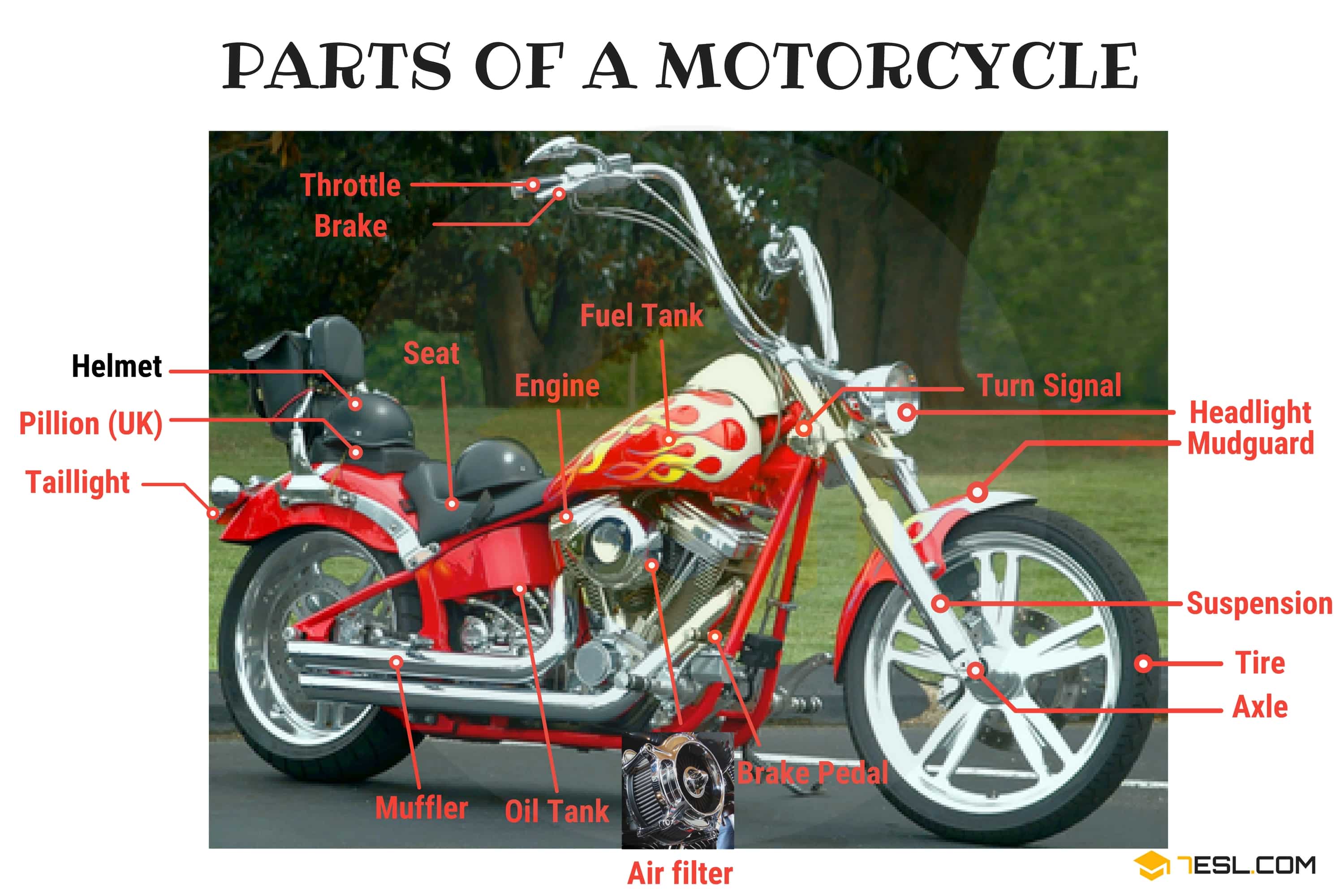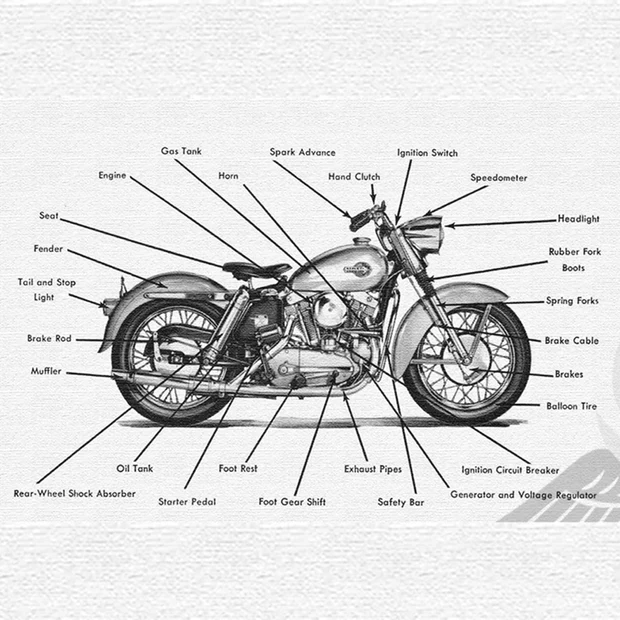Common Problems Solved with Authentic OEM Parts New Zealand
Common Problems Solved with Authentic OEM Parts New Zealand
Blog Article
Discover the Important MotorBike Parts You Need for Optimal Efficiency
Recognizing the important parts of a bike is basic for attaining peak efficiency. Each component, from the engine to the stopping system, plays a vital duty in overall capability and safety and security. Routine maintenance can avoid unanticipated failings and enhance the riding experience. Nonetheless, many riders overlook the intricacies of these systems. Uncovering how they collaborate can result in an extra effective ride. What critical components should every cyclist prioritize?
The Engine: The Heart of Your Motorcycle
The engine works as the core element of a bike, driving its performance and defining its abilities. It is in charge of converting fuel right into power, which powers the bike ahead. Different kinds of engines are used, consisting of single-cylinder, V-twin, and inline setups, each offering distinct characteristics suited for various riding designs and objectives. The engine dimension, commonly determined in cubic centimeters (cc), significantly affects performance, with larger engines usually giving more power and torque.Furthermore, the engine's style and technology, such as fuel shot systems or air-cooling versus liquid-cooling, affect performance and dependability. Maintenance is important for peak operation; factors like regular oil modifications and checking spark connects assurance durability. Riders typically take into consideration an engine's responsiveness and level of smoothness, as these attributes improve the total riding experience. Ultimately, the engine stays an essential component that defines not only the motorbike's performance but likewise the biker's connection to the maker.
The Transmission: Changing Gears Smoothly
The transmission plays a necessary duty in a motorcycle's efficiency, especially in the technicians of equipment moving. Understanding exactly how to move gears efficiently can enhance the total riding experience, while normal upkeep assurances peak functionality. Correct attention to these aspects can considerably impact the longevity and effectiveness of the motorcycle.

Gear Shifting Mechanics
Smooth gear changing is essential for ideal motorcycle efficiency, substantially impacting both acceleration and control. The mechanics of gear moving include the interaction in between the clutch, equipment lever, and transmission system. When a biker engages the clutch, it disengages the engine from the transmission, enabling a gear change without harming the components. A well-timed release of the clutch, incorporated with specific activity of the gear lever, helps with a seamless adjustment in between equipments. This process assures that the engine operates within its best power band, improving performance. Motorbike Components NZ. In addition, comprehending the equipment ratios and their result on speed and torque can assist cyclists make notified choices during shifts, eventually adding to an extra responsive and pleasurable riding experience
Maintenance Tips Value
Routine upkeep plays an important duty in guaranteeing that the transmission system operates effectively, enabling smooth gear shifts. Frequently altering the transmission and inspecting fluid is essential, as old fluid can cause enhanced rubbing and wear. In addition, evaluating the clutch for wear assurances peak engagement and disengagement, avoiding slippage throughout equipment modifications. Lubrication of moving parts is equally vital to decrease rubbing and improve performance. Motorbike owners must additionally keep track of for leaks and uncommon noises, as these can indicate underlying issues. By sticking to these maintenance tips, riders can lengthen the lifespan of their transmission system, guaranteeing that equipment shifts stay smooth and adding to the general performance of their motorbike.
The Braking System: Ensuring Safety And Security on Every Experience
Braking systems are fundamental parts that directly affect a motorbike's security and efficiency. They include numerous components, consisting of brake pads, rotors, calipers, and hydraulic lines, all collaborating to guarantee effective deceleration. The kind of braking system-- generally either disc or drum-- affects responsiveness and quiting power.Regular upkeep is essential to support peak efficiency; used brake pads can cause decreased efficiency and raised quiting distances. In addition, the top quality of brake liquid should be checked, as it can absorb dampness with time, jeopardizing stopping efficiency.Riders should additionally take into consideration the significance of anti-lock braking systems (ABS), which protect against wheel lockup throughout sudden quits, enhancing total safety. Correctly operating brakes are not nearly stopping; they infuse confidence in the rider, permitting safer navigating through numerous terrains. Ultimately, a reputable braking system is essential for enjoying every ride with comfort.
The Suspension: Enhancing Convenience and Control
A well-functioning shock absorber considerably adds to a motorbike's total performance, complementing the performance of the braking system. The suspension plays a considerable function in soaking up shocks from unequal surface areas, ensuring a smoother ride while keeping tire call with the roadway. This call is important for both stability and control, permitting riders to navigate corners with confidence and precision.Different types of shock absorber, such as telescopic forks or mono-shocks, use varying degrees of convenience and handling. Correctly tuned suspension enhances responsiveness, providing the biker with a much more linked feeling to the motorbike. Normal upkeep checks are necessary to determine the suspension elements, consisting of dampers and springs, are functioning at their ideal. A reliable suspension system not just boosts the riding experience however likewise adds to the longevity of other motorbike components by lessening damage. Because of this, spending in high quality suspension is crucial like this for any type of significant motorbike lover.
The Tires: Connecting You to the Roadway
Tires play an important role in a motorcycle's efficiency, functioning as the main link between the road and the rider. Understanding the different sorts of tires available can significantly influence handling and safety. In addition, routine upkeep is vital to guarantee peak tire performance and durability.
Tire Types Explained
How do different tire kinds affect a motorbike's performance? Tire types play a crucial role in identifying a motorcycle's stability, grip, and handling. Sport tires, made for high performance, offer enhanced traction and responsiveness on paved roads, making them excellent for competing and aggressive riding. Alternatively, touring tires focus on sturdiness and comfort, offering a smoother trip for long-distance travel. Off-road tires, identified by their tough walk patterns, master grip on unpaved surfaces, ideal for experience lovers. Furthermore, dual-sport tires blend features from both on-road and off-road categories, dealing with flexible riding needs. Inevitably, choosing the right tire type is vital for optimizing performance, making sure safety and security, and improving the overall riding experience.
Maintenance Tips Offered
While riding when driving, maintaining perfect tire problem is important for safety and security and performance. Routinely checking tire stress is vital, as under-inflated tires can lead to inadequate handling and increased wear. It is a good idea to evaluate walk deepness often; worn tires concession grip and security. Furthermore, cyclists ought to try to find signs of damages, such as cracks or bulges, which can indicate the demand for substitute. Turning tires periodically assures also put on, enhancing durability. Keeping tires clean from debris and staying clear of extreme aesthetics can lengthen their life expectancy. Preserving appropriate positioning and equilibrium contributes to come to a head efficiency, decreasing stress and anxiety on other bike parts. Adhering to these upkeep suggestions will considerably enhance the general riding experience.
The Gas System: Fueling Efficiency and Performance
The gas system plays a vital function in maximizing a motorbike's performance and effectiveness, as it ensures the ideal distribution of gas to the engine. It comprises a number of crucial components, consisting of the gas storage tank, fuel pump, gas filter, and fuel injectors or carburetor. Each component should function successfully to ensure a powerful and smooth ride.The fuel tank stores gasoline and supplies it to the engine via the gas pump, which generates the required pressure. A gas filter protects against contaminants from getting in the engine, while the injectors or carburetor mix fuel with air for combustion.Proper maintenance of the fuel system is essential; a clogged up filter or malfunctioning injector can cause lowered performance and enhanced fuel visit this website consumption. By verifying that the gas system operates successfully, motorcyclists can appreciate enhanced throttle action, much better fuel economic climate, and in general enhanced riding experience.
The Electric System: Powering Your Trip
An effective electrical system is essential for the overall functionality and safety and security of a motorcycle, as it powers important elements such as the ignition, illumination, and different electronic systems. This system includes the battery, which shops energy, and the alternator, responsible for creating power while the engine runs. The wiring harness attaches these components, guaranteeing dependable power distribution.Additionally, integrates shield the system from overloads, while relays aid regulate high-current devices with low-power signals. A properly maintained electrical system enhances efficiency by ensuring smooth starts and constant operation of lights and signals, crucial for cyclist visibility and safety.Regular checks of the battery's cost and links are very important for stopping electric failures. Bikers ought to likewise check circuitry for deterioration, ensuring all elements operate preferably. Eventually, a robust electric system contributes considerably to the total performance and dependability of the this content motorcycle.
Regularly Asked Inquiries
Just how Typically Should I Change My Motorcycle's Battery?
The frequency of bike battery replacement depends on use and upkeep (Motorcycle Parts Auckland). Typically, batteries need to be replaced every three to 5 years. Regular checks can assist recognize when a replacement is necessary for peak performance
What Tools Do I Need for Basic Motorcycle Maintenance?
For fundamental bike upkeep, one needs crucial devices such as a socket collection, wrenches, screwdrivers, pliers, tire pressure gauge, and a torque wrench. These tools facilitate efficient maintenance and ensure the bike runs efficiently and safely.
Exactly How Can I Enhance My Motorbike's Aerodynamics?
To improve motorcycle aerodynamics, one must think about readjusting fairings, utilizing windshield extensions, maximizing body setting, and lowering total weight. These alterations assist minimize drag, boosting stability and fuel efficiency during rides.
What Are the Signs of a Failing Electric System?
Indicators of a failing electrical system consist of lowering lights, problem starting, uneven instrument readings, and blown merges. Oem Parts New Zealand. Unusual scents or deterioration around battery terminals might also indicate underlying problems needing prompt focus for safety and security and performance

How Do I Pick the Right Oil for My Motorcycle?
When selecting oil for a motorcycle, one ought to take into consideration the maker's specifications, viscosity rankings, and the type of riding. Furthermore, synthetic versus traditional oil can affect efficiency and engine security, influencing the choice considerably. The engine size, usually determined in cubic centimeters (cc), significantly affects efficiency, with larger engines normally supplying even more power and torque.Furthermore, the engine's design and modern technology, such as fuel injection systems or air-cooling versus liquid-cooling, affect efficiency and integrity. A well-functioning suspension system significantly adds to a motorcycle's total performance, enhancing the performance of the braking system. The fuel system plays an essential function in optimizing a motorcycle's performance and performance, as it assures the optimum delivery of gas to the engine. A gas filter prevents impurities from going into the engine, while the injectors or carburetor mix gas with air for combustion.Proper upkeep of the gas system is vital; a clogged up filter or malfunctioning injector can lead to decreased performance and boosted fuel usage. A well-kept electric system enhances efficiency by making sure smooth begins and constant procedure of lights and signals, crucial for rider visibility and safety.Regular checks of the battery's cost and connections are important for preventing electrical failings.
Report this page